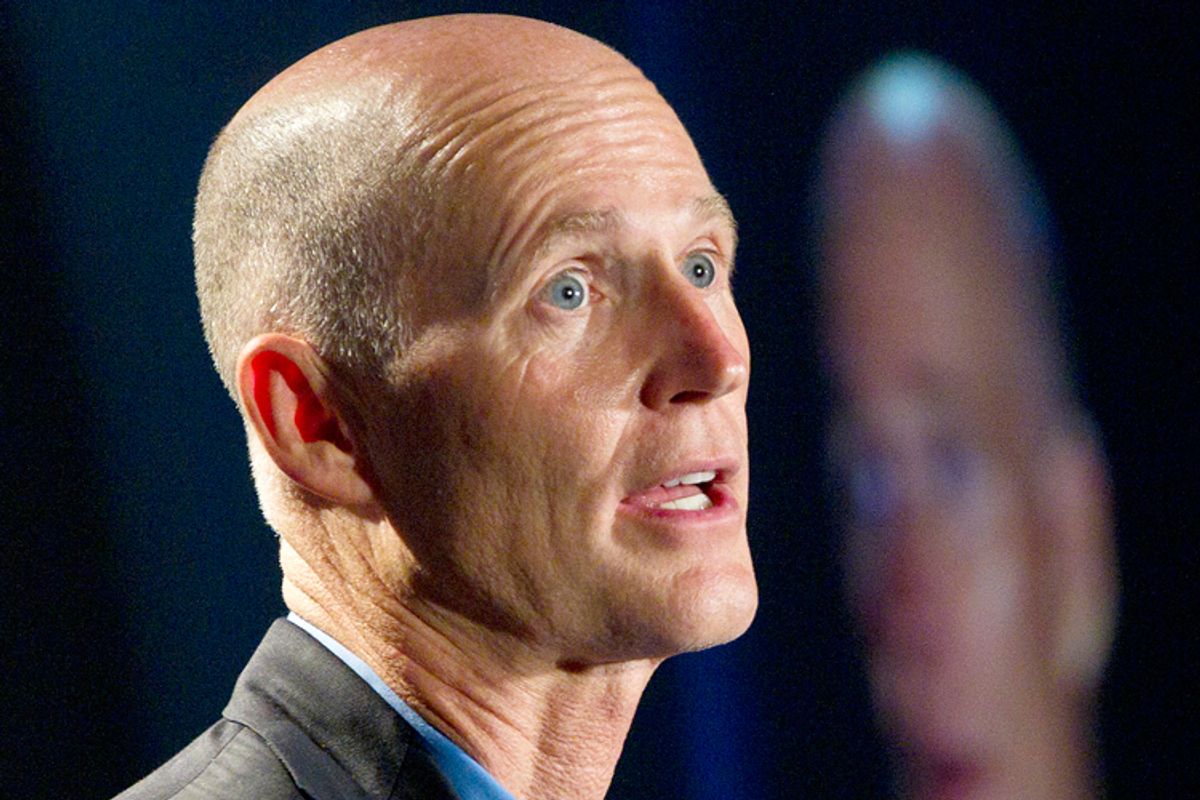Rick Scott has done everything in his power as the Republican governor of Florida to make sure that the Affordable Care Act does not work as intended in his state. Like a good many of his GOP colleagues around the nation, he rejected federal money to expand Medicaid eligibility and he refused to let the state set up its own insurance marketplace. But Scott took his opposition even further and actually pushed through laws that made it harder for the state to negotiate with insurance companies on premiums for certain types of insurance plans. He also made it more difficult for people to receive assistance from Obamacare “navigators” when shopping for insurance plans on the federal marketplace. And then, after setting up all those roadblocks to the law’s success, Scott had the nerve to attack the law for not performing as advertised.
Now, as a consequence of all that opposition, Scott finds himself embroiled in a mess over federal healthcare funding. It’s a bit convoluted, but bear with me. Since 2005, Florida has been participating in a program called the Low Income Pool (LIP), which uses federal dollars to help cover the costs of uncompensated care in hospitals. The federal spending is subject to renewal by the Centers for Medicare and Medicaid Services (CMS), and when CMS approved a one-year renewal in April 2014, it instructed the state to revamp its Medicaid structure in such a way that would provide “quality health care services to Florida’s Medicaid beneficiaries throughout the state without the need for LIP funding.” Put simply, the feds told Florida to get ready for this money to be cut off.
But Rick Scott didn’t do that. Instead, he put together a budget proposal that assumed continued LIP funding. In February, CMS told Florida that the funding, as they’d indicated a year earlier, would not be renewed. Panic ensued, which led to the most recent development: Rick Scott is suing the Obama administration to compel CMS to renew the LIP funding, claiming that the administration is trying to coerce Florida to expand Medicaid under the Affordable Care Act.
Since his initial opposition, Scott’s gone back and forth on whether he supports expanding Medicaid, but at the moment he’s against it, and he’s using the expiration of the LIP funding as justification for saying no. “The same federal government that offers some money for a program is walking away from another health care program," Scott said a couple of weeks ago. "How can you feel comfortable picking up another federal program when they are walking away from an existing program?”
That’s nonsense. The LIP funding, as noted, is subject to the discretion of CMS. Funding for expanded Medicaid is backed by the force of law. Even Republicans in the state aren’t buying it. “The federal government has no obligation to provide LIP funding, or to work within our timeframe,” the Republican president of the Florida Senate said in a statement. The bottom line is that Scott very much wants federal healthcare funding. What he doesn’t want, as Greg Sargent observes, is for that funding to be associated with “Obamacare.”
What’s curious about all this is why Scott, as an on-again-off-again opponent of expanded Medicaid, doesn’t just follow the example of other Republican governors who contorted themselves politically to accept the money while remaining opposed to “Obamacare.” He has two readymade examples to pick from: John Kasich in Ohio, and Mike Pence in Indiana. Kasich jammed the Medicaid expansion through despite opposition from Republicans in the state legislature, and has since been trying to convince people that expanded Medicaid doesn’t really count as “Obamacare.” That’s silly, but the end result is still more Ohioans with coverage. Pence – a hardline, red-meat conservative if there ever was one – worked out a compromise with the Department of Health and Human Services that allows him to use Obamacare money to expand an existing Indiana health program. He’s out there trying to spin it as Medicaid “reform,” but it’s still Obamacare and it’s still covering low-income Indianans.
So it can be done, but two obstacles stand in the way of Rick Scott pulling off such a feat in Florida. The first is that the Republican-controlled Florida House of Representatives is dead-set against any sort of expansion. The second is that Rick Scott has ambitions to take his talents to the U.S. Senate in 2018, and he knows what happened to the last Republican governor of Florida who ran for Senate after embracing part of the Obama agenda. The Koch-funded activist group Americans for Prosperity is campaigning hard against expanding Medicaid in Florida, and Scott has to be wary of angering deep-pocketed outside groups.
Whatever the reasons for Scott’s recalcitrance, the real impact of leaving the Affordable Care Act’s Medicaid money on the table is that roughly 670,000 Floridians are being denied access to affordable healthcare. It’s the state with the second largest Medicaid coverage gap, trailing only Texas. That’s a lot of people who are eagerly waiting to find out what exactly Rick Scott has planned for them.

Shares